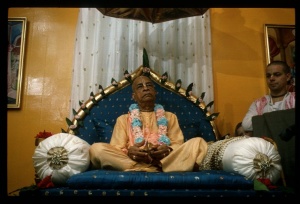SB 9.21.12: Difference between revisions
m (1 revision(s)) |
No edit summary |
||
| Line 1: | Line 1: | ||
{{info | {{info | ||
|speaker=King Rantideva | |speaker=King Rantideva | ||
|listener=King Rantideva speaking to himself | |listener=King Rantideva speaking to himself | ||
}} | }} | ||
[[Category:Srimad-Bhagavatam - Canto 09 Chapter 21]] | |||
[[Category:Bhagavatam Verses Spoken by Rantideva Maharaja - Vanisource|092112]] | |||
<div style="float:left">'''[[Srimad-Bhagavatam]] - [[SB 9|Ninth Canto]] - [[SB 9|Ninth Canto]] - [[SB 9.21: The Dynasty of Bharata|Chapter 21: The Dynasty of Bharata]]'''</div> | |||
<div style="float:right">[[File:Go-previous.png|link=SB 9.21.11]] '''[[SB 9.21.11]] - [[SB 9.21.13]]''' [[File:Go-next.png|link=SB 9.21.13]]</div> | |||
{{RandomImage}} | |||
==== TEXT 12 ==== | ==== TEXT 12 ==== | ||
<div | <div class="verse"> | ||
na kāmaye 'haṁ gatim īśvarāt parām | :na kāmaye 'haṁ gatim īśvarāt parām | ||
aṣṭarddhi-yuktām apunar-bhavaṁ vā | :aṣṭarddhi-yuktām apunar-bhavaṁ vā | ||
ārtiṁ prapadye 'khila-deha-bhājām | :ārtiṁ prapadye 'khila-deha-bhājām | ||
antaḥ-sthito yena bhavanty aduḥkhāḥ | :antaḥ-sthito yena bhavanty aduḥkhāḥ | ||
</div> | </div> | ||
| Line 17: | Line 22: | ||
==== SYNONYMS ==== | ==== SYNONYMS ==== | ||
<div | <div class="synonyms"> | ||
''na''—not; ''kāmaye''—desire; ''aham''—I; ''gatim''—destination; ''īśvarāt''—from the Supreme Personality of Godhead; ''parām''—great; ''aṣṭa-ṛddhi-yuktām''—composed of the eight kinds of mystic perfection; ''apunaḥ-bhavam''—cessation of repeated birth (liberation, salvation); ''vā''—either; ''ārtim''—sufferings; ''prapadye''—I accept; ''akhila-deha-bhājām''—of all living entities; ''antaḥ-sthitaḥ''—staying among them; ''yena''—by which; ''bhavanti''—they become; ''aduḥkhāḥ''—without distress. | |||
</div> | </div> | ||
| Line 24: | Line 29: | ||
==== TRANSLATION ==== | ==== TRANSLATION ==== | ||
<div | <div class="translation"> | ||
I do not pray to the Supreme Personality of Godhead for the eight perfections of mystic yoga, nor for salvation from repeated birth and death. I want only to stay among all the living entities and suffer all distresses on their behalf, so that they may be freed from suffering. | I do not pray to the Supreme Personality of Godhead for the eight perfections of mystic yoga, nor for salvation from repeated birth and death. I want only to stay among all the living entities and suffer all distresses on their behalf, so that they may be freed from suffering. | ||
</div> | </div> | ||
| Line 31: | Line 36: | ||
==== PURPORT ==== | ==== PURPORT ==== | ||
<div | <div class="purport"> | ||
Vāsudeva Datta made a similar statement to Śrī Caitanya Mahāprabhu, requesting the Lord to liberate all living entities in His presence. Vāsudeva Datta submitted that if they were unfit to be liberated, he himself would take all their sinful reactions and suffer personally so that the Lord might deliver them. A Vaiṣṇava is therefore described as being para-duḥkha-duḥkhī, very much aggrieved by the sufferings of others. As such, a Vaiṣṇava engages in activities for the real welfare of human society. | Vāsudeva Datta made a similar statement to Śrī Caitanya Mahāprabhu, requesting the Lord to liberate all living entities in His presence. Vāsudeva Datta submitted that if they were unfit to be liberated, he himself would take all their sinful reactions and suffer personally so that the Lord might deliver them. A Vaiṣṇava is therefore described as being ''para-duḥkha-duḥkhī'', very much aggrieved by the sufferings of others. As such, a Vaiṣṇava engages in activities for the real welfare of human society. | ||
</div> | </div> | ||
__NOTOC__ | |||
<div style="float:right; clear:both;">[[File:Go-previous.png|link=SB 9.21.11]] '''[[SB 9.21.11]] - [[SB 9.21.13]]''' [[File:Go-next.png|link=SB 9.21.13]]</div> | |||
__NOTOC__ | |||
__NOEDITSECTION__ | |||
Revision as of 10:05, 17 May 2021

A.C. Bhaktivedanta Swami Prabhupada
TEXT 12
- na kāmaye 'haṁ gatim īśvarāt parām
- aṣṭarddhi-yuktām apunar-bhavaṁ vā
- ārtiṁ prapadye 'khila-deha-bhājām
- antaḥ-sthito yena bhavanty aduḥkhāḥ
SYNONYMS
na—not; kāmaye—desire; aham—I; gatim—destination; īśvarāt—from the Supreme Personality of Godhead; parām—great; aṣṭa-ṛddhi-yuktām—composed of the eight kinds of mystic perfection; apunaḥ-bhavam—cessation of repeated birth (liberation, salvation); vā—either; ārtim—sufferings; prapadye—I accept; akhila-deha-bhājām—of all living entities; antaḥ-sthitaḥ—staying among them; yena—by which; bhavanti—they become; aduḥkhāḥ—without distress.
TRANSLATION
I do not pray to the Supreme Personality of Godhead for the eight perfections of mystic yoga, nor for salvation from repeated birth and death. I want only to stay among all the living entities and suffer all distresses on their behalf, so that they may be freed from suffering.
PURPORT
Vāsudeva Datta made a similar statement to Śrī Caitanya Mahāprabhu, requesting the Lord to liberate all living entities in His presence. Vāsudeva Datta submitted that if they were unfit to be liberated, he himself would take all their sinful reactions and suffer personally so that the Lord might deliver them. A Vaiṣṇava is therefore described as being para-duḥkha-duḥkhī, very much aggrieved by the sufferings of others. As such, a Vaiṣṇava engages in activities for the real welfare of human society.